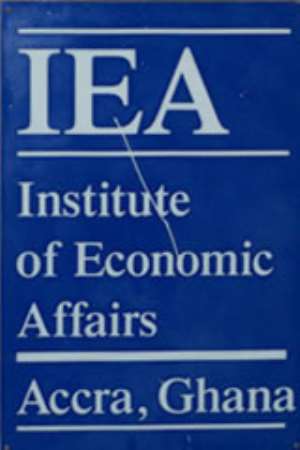
The Institute of Economic Affairs (IEA) on Monday said despite the economic growth recorded in the past, there was deterioration in the performance in 2007, continuing the trend started in 2006.
“In spite of the achievement of growth rates of slightly above six per cent the relative macroeconomic stability achieved during the period 2001-2005, marked by declining inflation and interest rates and low government budget deficits, the economy showed clear signs of stress in 2006 and 2007.”
The IEA stated in its annual 2007 Economic Review and Outlook documents made available to the Ghana News Agency in Accra that the performance of the economy deteriorated further in the first half of 2008 (January to June 2008) with rising inflation which peaked at 18.4 per cent in June 2008.
The Economic Review presents an overview of the performance of the economy during the calendar year 2007 and outlook for 2008 and beyond based on provisional data released by the Ghana Statistical Service.
The IEA 2007 Economic Review and Outlook Survey was conducted by a team of economists including Dr Kwabena Asomanin Anaman, IEA Head of Economic Centre and Director of Research, Professor Alhassan Wayo Seini, IEA Senior Fellow, Prof John Asafu-Adjaye, IEA Senior Fellow and Mrs Charity Osei-Amponsah, IEA Research Assistant.
The rest are Dr Daniel Bruce Sarpong, Senior Lecturer and Head, Department of Agricultural Economics and Agribusiness, University of Ghana, Dr. Kofi Marfo, Mrs Abigail Abandah-Sam, Mr Matthew Armah and Mr Martin Esan Benjamin, all Seniors Executive Officers of Millennium Development Authority (MiDA), Accra.
The IEA Economic Review identified three major deficits - government budget, balance of trade and balance of payment deficits as the causes of the stress in the economy.
The report also noted that international lending agencies, such as the International Monetary Fund, said the country's international reserves declined to 2.4 months as at the end of June 2008, less than the minimum three months required.
According to the IEA it predicted in early January 2008 that the average inflation rate would increase to about 15 per cent in 2008.
The rate of inflation in October was 17.30 per cent, down from 17.89 per cent a month earlier, Dr Grace Bediako, Government Statistician, told a press conference on Friday.
The IEA suggested that the improvement of the economy in the short to medium term period would depend on several factors including moderation of the levels of world oil prices, and the extent of production from newly-discovered offshore oil fields.
Other means to improve the economy would depend on continued strong support by Ghana's development partners through grants and loans, strong financial discipline of government subsides, significant reduction of government waste and above all continuous political stability especially linked to transparent and peaceful national elections in December 2008.
Meanwhile the ruling New Patriotic Party (NPP) in its Election 2008 manifesto tagged: “Moving Ghana Forward-Building a Modern Ghana,” said inflation had been brought down to 18 per cent in spite of the serious exogenous shocks arising from the steep increases in global oil and food prices.
“…(Government has restored macroeconomic balance, low and declining rates of inflation, lower interest rates and a stable currency that has held its own for six straight years,” the NPP stated in its manifesto.
The party noted that these spectacular successes had engendered growing international confidence in the Ghanaian economy and had made possible the significant inflows of foreign direct investment, particularly in the banking, energy, and oil and gas exploration fields.
The main opposition National Democratic Congress (NDC) on the other hand in its manifesto dubbed: “A Better Ghana – Investment in People, Jobs and the Economy,” said the NPP government had failed miserably in the management of the economy, employment, the environment, health, education and the utilities services.”
The NDC said NPP had not managed the economy well in spite of the party's claims that the economy was on track. “The facts and figures paint a very bleak picture of an economy that is not on track.”
The Convention People's Party (CPP) in its manifesto dubbed: “New Dawn, New Vision,” described the economy growth as uneven which has benefited only a handful of people and companies.
”Growing inequality and diminishing economic opportunities have led to an unprecedented increase in crime, including armed robberies,” the CPP noted.




 Ejisu by-election: Aduomi warns NPP against voter intimidation
Ejisu by-election: Aduomi warns NPP against voter intimidation
 High Court orders implicated four NDA officials to present defence
High Court orders implicated four NDA officials to present defence
 Let’s all be matured, patriotic to have a peaceful election this year – Dampare ...
Let’s all be matured, patriotic to have a peaceful election this year – Dampare ...
 Mahama's administration saw thievery that knew no bounds; stole from market wome...
Mahama's administration saw thievery that knew no bounds; stole from market wome...
 GRA/SML deal: Always read the stories behind the headlines or you'd look stupid ...
GRA/SML deal: Always read the stories behind the headlines or you'd look stupid ...
 GRA/SML Contract: It takes some 'wild' boldness for a president to make this dec...
GRA/SML Contract: It takes some 'wild' boldness for a president to make this dec...
 Elisu By-election: "If you call yourself a man, boo Chairman Wontumi again" — Bo...
Elisu By-election: "If you call yourself a man, boo Chairman Wontumi again" — Bo...
 Fuel tanker driver escapes with his life after tanker goes up in flames near Suh...
Fuel tanker driver escapes with his life after tanker goes up in flames near Suh...
 Uniform change: ‘Blue and white are brighter colours’ — Kwasi Kwarteng explains ...
Uniform change: ‘Blue and white are brighter colours’ — Kwasi Kwarteng explains ...
 MoE not changing all public basic school uniforms but only newly built ones — Kw...
MoE not changing all public basic school uniforms but only newly built ones — Kw...
